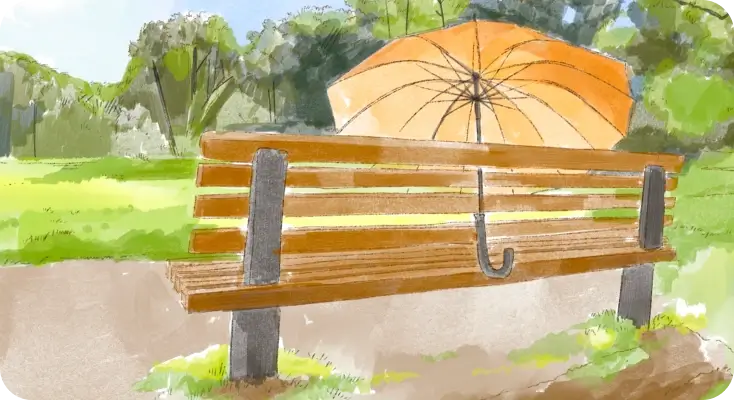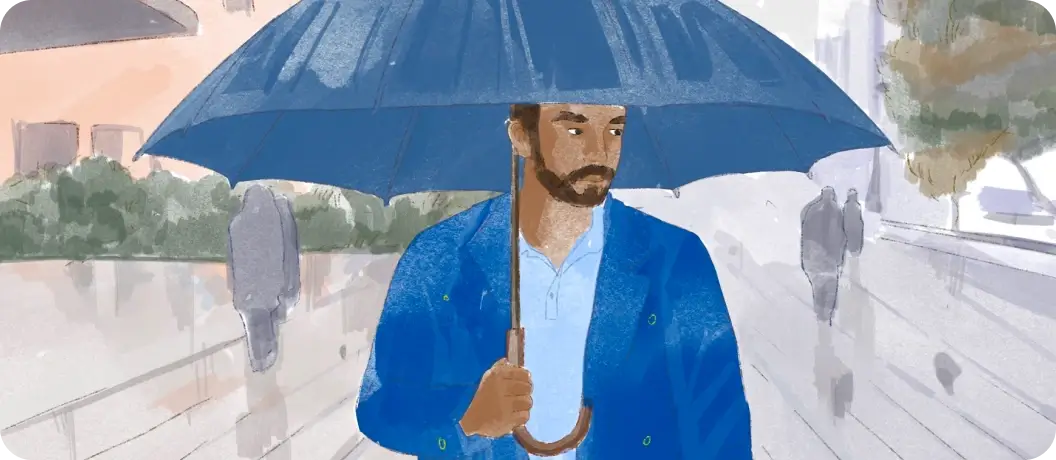“Excuse me… It isn’t my order. I asked for Paella, and you brought me Bolognese.”
Your voice is trembling, and your hands start shaking. Was it you really saying that? Unbelievable!
You are the one who often avoids eye contact, second-guesses every phrase, or finds it hard to speak up in a crowd. And this clarification to a waiter feels like a real feat!
Quick social anxiety test
Please choose one answer to each question that feels most relatable to you.
- How do you feel when meeting new people at a party?
A) Like a fish in water – totally at ease. I like making friends and communicating with different people.
B) A bit uneasy, as I might be shy. However, as we talk for a few minutes, I usually feel much better.
C) Extremely nervous, I’d rather be invisible. Too many strangers around is one of the reasons why I don’t like parties.
- When you have to speak in front of a group, how do you feel?
A) Confident and comfortable, like I was born for it.
B) This isn’t the thing I want to do daily, but usually everything is OK.
C) Even if I’m prepared, I often panic and feel scared to screw up.
- When someone calls you unexpectedly, what’s your reaction?
A) “Hello, how’re you doing?”, I answer without hesitation.
B) I’m not a big fan of phone calls and prefer messaging. However, if someone calls, I usually answer.
C) I ignore the call and feel my anxiety spike. I’d rather text this person later.
- How do you feel about making small talk with strangers?
A) I find it kind of fun. Talking with someone in a line is a great way to pass some time.
B) It’s a bit awkward, and I never start small talk on my own. Still, if someone starts talking, I’ll definitely answer.
C) It makes me super uncomfortable, and I do everything possible to avoid it.
- When you’re the center of attention, how do you react?
A) I thrive when all eyes are on me. It feels natural like I’m right where I’m meant to be.
B) I’m not a main character who craves the spotlight, but I can handle it without freaking out.
C) I’d rather disappear. My heart races, and I just want to escape the moment.

- How do you feel when ordering food in a busy restaurant?
A) There’s nothing special, I’m comfortable and confident.
B) I feel nervous when I need to order many dishes or clarify something, but usually, everything is fine.
C) Can someone order instead of me? I feel anxious just thinking about speaking up to a waiter.
- When asking someone for help, how do you feel?
A) It’s easy, I don’t mind asking at all.
B) I feel a little uneasy. Still, if the request is minor, I’m OK with it.
C) It’s very uncomfortable. I often avoid it and do everything on my own.
- How do you feel about attending large events like concerts or festivals?
A) I’m excited and love the energy of big crowds. The buzz of the event makes me feel alive.
B) I like going to concerts or festivals, but I can feel a bit anxious in large crowds. Sometimes, it takes me a while to settle in and enjoy myself.
C) I feel overwhelmed just thinking about large events. The noise, the crowd — it’s too much, so I usually avoid going altogether.
- Do you often replay conversations in your head, worrying about what you said?
A) Hardly ever. Once a conversation is over, it’s done for me. I don’t dwell on what I said.
B) Occasionally, I’ll think back on what I said, especially if something felt a bit awkward. But I usually shrug it off and move on.
C) All the time. I constantly replay conversations, analyzing every word I say and wondering if I sound weird or have made a mistake.
- When making a mistake in public, how do you react?
A) I laugh it off and move on.
B) I feel a bit embarrassed, but in a few minutes, I recover, and everything feels OK.
C) I’m awkward, and it sticks with me. I’ll overthink this moment for the next 10 years.
Do you have social anxiety? Instructions to answers to the quiz
Now, it’s high time to calculate the outcomes. Assign a number of points to each response, then total them to determine your result of a social anxiety disorder test.
- A — 1 point
- B — 2 points
- C — 3 points
Results of the social anxiety quiz
Ready? Good job! Let’s pull back the curtain and uncover the hidden layers of your confidence.
10-16 points
You aren’t likely to live with social anxiety disorder.
You love being in the spotlight and communicating with people. You make friends right after entering a new company and feel totally fine striking up conversations with strangers, right?
Even if this description doesn’t feel 100% relatable, the test for social anxiety shows you’re not afraid to dive into communication and meet new people. And, most probably, you don’t live with social anxiety.
Tip:
- Try to be mindful when communicating with others. While you seem a social butterfly, others may find communication more challenging. Remember that being empathetic and supporting those living with anxiety can make a huge difference to everyone around you.
17-24 points
You might face some social anxiety symptoms, but it doesn’t necessarily mean you have it.
Well, you’re not the one who always holds parties or stays in big crowds. Sometimes, sitting at home alone, reading a book, or watching a favorite film for the 10th time feels much more relaxing.
Socializing can be fun, but sometimes you need to rest and recharge from socializing.
How to know if you have social anxiety? Most likely, you don’t. While some signs of social anxiety feel relatable, it might stem from your introverted personality or need for personal downtime.
On the other hand, you may experience the symptoms of general anxiety disorder, which can make you prefer quieter places where you feel safe and in control.
Tip:
- Listen to your needs and give yourself a break. If you find peace in quiet places, that’s perfectly fine. When sometimes curling up alone seems an ideal way to spend time, just do it! Not everybody needs to be at the center of the action. Your feelings are valuable.
Ashley Coon, MA, Provisionally Licensed Counselor, adds, “Maybe you don’t struggle with full-blown social anxiety, but social interactions can make you uncomfortable from time to time, I get it! It’s important to be kind to that emotional response and ask yourself in that moment, “Why am I feeling uncomfortable right now?” Maybe you’re afraid everyone is looking at you funny or that you may misspeak. Whatever your fear may be, try to gently remind yourself that you’re not the only one who feels that way.”
25-30 points
There’s a high probability you experience social anxiety symptoms.
You might be wondering something like,
- “How do others handle so many interactions every day?”
- “Is it because they have some secret, or am I missing something?“
- “Am I socially awkward?”
Based on the quiz results, there are chances you live with social anxiety manifestations. While being shy or introverted is common, feeling uneasy or out of place when you talk with someone may be a warning sign.
Ashley Coon, MA, LPC, shares a simple yet effective insight, “A helpful thing to keep in mind is that people, more often than not, are a lot less concerned about our every movement than we think they are. Ask yourself this, “Do you spend all of your time in public honing in on one individual and watching their every move? I doubt it!”
Tip:
- If social anxiety influences your quality of life, reach out to a licensed therapist. Of course, chasing the limelight all the time isn’t necessary to stay happy. Still, socializing is an important part of our lives.
If you feel scared stiff anytime you need to talk with a stranger, it may be helpful to study your social anxiety further and get professional help.
FAQ about “Do I have social anxiety?” quiz
What is social anxiety disorder? (SAD)
Social anxiety disorder is a constant, intense fear of social situations. People who live with SAD are afraid that others will judge them, criticize them, or watch their every move.
Those living with social anxiety find it challenging to:
- ask for help
- talk to strangers
- speak in public
- being in big groups of people
- start conversations, etc.
How to understand whether I have social anxiety or I’m an introvert?
Social anxiety is all about a deep-rooted fear of social interactions. It can make you want to steer clear of people and feel really anxious. Because of this, people with social anxiety might avoid any kind of communication.
Being introverted, on the other hand, just means you enjoy hanging out in smaller circles or spending time alone. It’s more about finding peace in quiet moments rather than avoiding social situations because of stress.
Social anxiety VS. autism. What’s the difference?
The difference between social anxiety and autism is like night and day. Yet, these conditions sometimes overlap in symptoms.
Both social anxiety and autism might involve challenges with social interactions. But while for SAD, this is the main sign of the condition, autism also usually involves:
- repetitive behaviors
- sensory sensitivities
- intense focus on certain topics
- unusual speech patterns, etc.
How to test for social anxiety?
Please note that only a licensed therapist can diagnose you with social anxiety or any other similar mental health condition.
This social anxiety test is a free and simple tool to help you find out whether you experience the symptoms of the disorder. However, it isn’t a replacement for professional help.
If you’re worried about your results or find social situations tough, talking to a mental health expert can give you the support and answers you need.
We asked Ashley Coon, MA, LPC, about how testing for social anxiety usually happens in therapy sessions, “Upon meeting your therapist, they will ask you to explain your mental health concerns, symptoms, struggles, and previous traumatic or difficult experiences. They may also ask you questions about your socialization as a child. You can express to them that you believe you struggle with social anxiety disorder if you feel comfortable. From there, your therapist may use the DSM-5 to go over the symptoms of social anxiety disorder with you. Depending on your therapist’s licensure and credentials, they may also utilize assessments and further diagnostic instruments. A mental health therapist will be able to discuss why you do or do not qualify for a social anxiety disorder diagnosis.”
Disclaimer
This article is for general informative and self-discovery purposes only. It should not replace expert guidance from professionals.
Any action you take in response to the information in this article, whether directly or indirectly, is solely your responsibility and is done at your own risk. Breeze content team and its mental health experts disclaim any liability, loss, or risk, personal, professional, or otherwise, which may result from the use and/or application of any content.
Always consult your doctor or other certified health practitioner with any medical questions or concerns
Breeze articles exclusively cite trusted sources, such as academic research institutions and medical associations, including research and studies from PubMed, ResearchGate, or similar databases. Examine our subject-matter editors and editorial process to see how we verify facts and maintain the accuracy, reliability, and trustworthiness of our material.
Was this article helpful?






